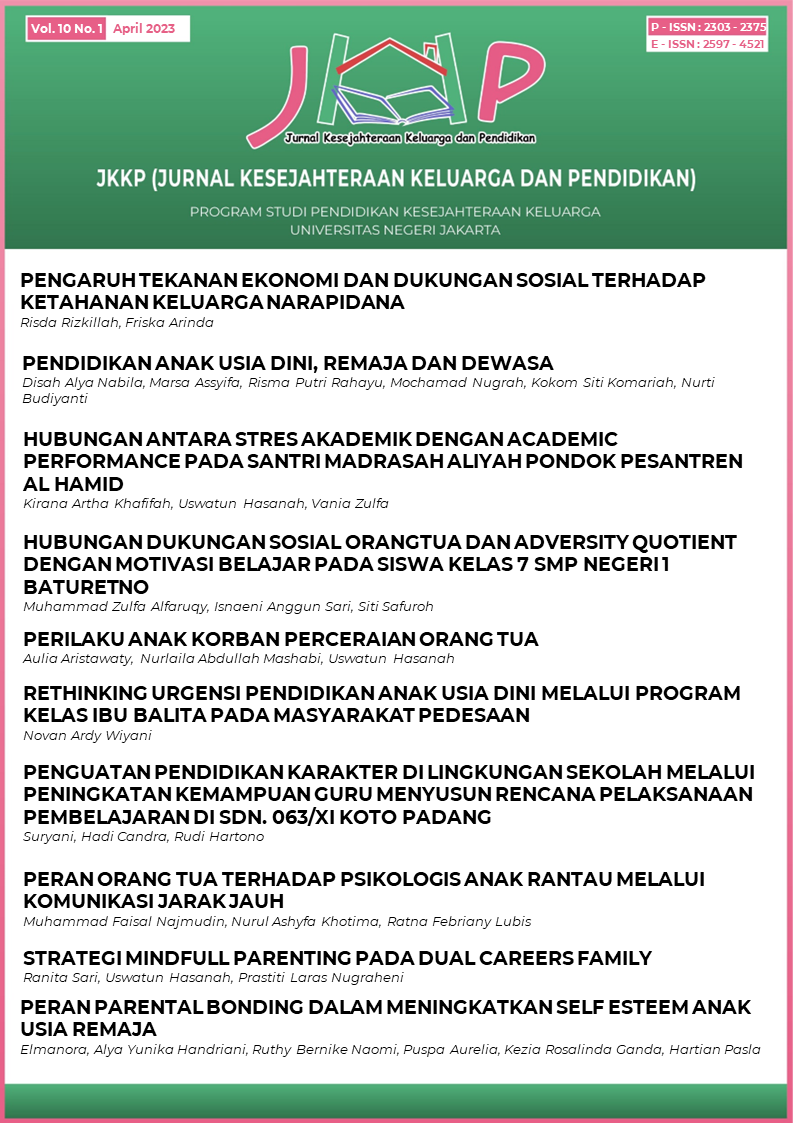HUBUNGAN DUKUNGAN SOSIAL ORANGTUA DAN ADVERSITY QUOTIENT DENGAN MOTIVASI BELAJAR PADA SISWA KELAS 7 SMP NEGERI 1 BATURETNO
DOI:
https://doi.org/10.21009/JKKP.101.04Keywords:
adversity quotient, dukungan sosial orangtua, motivasi belajar, sekolah menengah pertama, siswaAbstract
Abstrak
Transisi pendidikan dari sekolah dasar menuju sekolah menengah pertama merupakan tantangan bagi siswa, khususnya siswa tahun pertama. Siswa tahun pertama perlu mempunyai motivasi belajar yang tinggi guna dapat menjawab tantangan akademik maupun non akademik. Motivasi belajar dipengaruhi oleh faktor intrinsik dari dalam diri maupun faktor ekstrinsik dari lingkungan sosial. Penelitian bertujuan untuk mengetahui hubungan antara dukungan sosial orangtua dan adversitity quotient dengan motivasi belajar secara parsial dan simultan. Populasi adalah siswa kelas tujuh Sekolah Menengah Pertama (SMP) Negeri 1 Baturetno. Total sampling digunakan sebagai teknik sampling. Sehingga subjek yang terlibat dalam penelitian ini adalah seluruh siswa baru kelas tujuh yang berjumlah 255 orang. Pengumpulan data menggunakan Skala Dukungan Sosial Orangtua (12 aitem, α = 0,893), Skala Adversity Quotient (16 aitem, α = 0,895), dan Skala Motivasi Belajar (11 aitem, α = 0,891). Data dianalisis dengan analisis regresi berganda. Hasil penelitian menunjukkan ada hubungan dukungan sosial orangtua dan adversitity quotient dengan motivasi belajar secara parsial dan simultan. Dukungan sosial orangtua dan adversity quotient berpengaruh secara simultan sebesar 61,6% terhadap motivasi belajar siswa. Penelitian ini berimplikasi pada urgensi peran keluarga dalam mendukung keberhasilan siswa di sekolah. Keluarga, khususnya orangtua, perlu menjadi lingkungan sosial yang mendukung serta menempa ketangguhan siswa demi menumbuhkembangkan motivasi belajar.
Abstract
The transition from elementary school to junior high school is a challenge for students, especially first-year students. First-year students need to have high learning motivation to be able to answer current academic and non-academic challenges. Learning motivation is influenced by intrinsic factors which come from inside and extrinsic factors from the social environment. The research aims to determine the relationship between parental social support and adversity quotient with learning motivation, both partial and simultaneous. The population is seventh-grade students of SMP Negeri 1 Baturetno. We used total population sampling. The subjects involved in this study were all first-year junior high school students, totaling 255 people. Data collection used the Parents' Social Support Scale (12 items, α = 0.893), Adversity Quotient Scale (16 items, α = 0.895), and Learning Motivation Scale (11 items, α = 0.891). Data were analyzed by multiple regression analysis. The results showed that there was a relationship between parental social support and adversity quotient with learning motivation, both partial and simultaneous. Parental social support and adversity quotient have an effect of 61.6% on students' learning motivation. This research has implications for the urgency of the role of the family in supporting student success at school. Families, especially parents, need to be in a social environment that supports and forges student resilience to develop motivation to learn.
Downloads
Published
Issue
Section
License
Copyright (c) 2025 Muhammad Zulfa Alfaruqy, Isnaeni Anggun Sari, Siti Safuroh

This work is licensed under a Creative Commons Attribution-ShareAlike 4.0 International License.
Authors who publish with this Journal agree to the following terms:
- Author retain copyright and grant the journal right of first publication with the work simultaneously licensed under a creative commons attribution licensethat allow others to share the work within an acknowledgement of the work’s authorship and initial publication of this journal.
- Authors are able to enter into separate, additional contractual arrangementfor the non-exclusive distribution of the journal’s published version of the work (e.g. acknowledgement of its initial publication in this journal).
- Authors are permitted and encouraged to post their work online(e.g. in institutional repositories or on their websites) prior to and during the submission process, as it can lead to productive exchanges, as well as earlier and greater citation of published works.
Users/public use of this website will be licensed to CC BY SA
![]()







